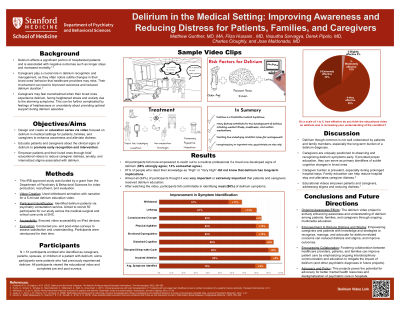Delirium
(068) Delirium Education through Video: Improving Awareness and Reducing Distress for Patients, Families, and Caregivers


Matthew Gunther, MD, MA (he/him/his)
Clinical Assistant Professor
Stanford University
Palo Alto, California
Filza Hussain, MD,FACLP
Clincial Associate Professor
Stanford University- School of Medicine
Palo Alto, California
Presenting Author(s)
Co-Author(s)
Background/Significance: This study's purpose is to increase knowledge and awareness on delirium by using an animated brief educational video. Patients and caregivers are the main target audience. Our goal is to demystify delirium, increase awareness, and reduce distress and anxiety around the syndrome.
Delirium can often go unrecognized. Caregivers are often at bedside for extended periods of time and are uniquely situated to have a continuous observation of their loved one’s mental status and cognitive functioning. There are other benefits to family involvement including reduced length of hospital stay, reduced family anxiety, and potential to reduce delirium duration. Discussions with families can reduce the distress often experienced with cases of delirium, with a particular focus on ways for families to be involved in improving the symptoms and knowledge about outcomes.
Methods: We were awarded $10,000 in the form of an Innovator Grant from Department of Psychiatry & Behavioral Sciences at Stanford for this project. We utilized a whiteboard animation software with narration to craft a 5-minute on delirium for patients, families, and caregivers. This video will be accessible via iPads in patient rooms. Using the psychiatry consultation service census, we will identify patients with current delirium and offer to the patient and caregivers access to the video. We will assess satisfaction with the educational content as well as confidence in understanding of delirium via a survey.
Results: Our results are in progress. Based on our timeline, the project will be complete with full data to present at the November 2024 meeting based on the above.
Discussion: Multimedia aids have been shown to be more effective for patient education than routine methods of discussion with provider and patient. A multimedia approach leads to improvement in understanding for patients and their families, as well as in individuals with lower baseline understanding. We would argue that delirium as an entity is poorly understood amongst patients and their families and is a great target for improvement. Beyond education, however, there is value in video assisted education for delirium and other conditions. One study identified video education for patients with inflammatory bowel disease (IBD) as having an impact on compliance (follow up visits) as well as depression ratings—both areas of clinical care that apply to many delirium cases.
Conclusion: By providing education to patients and their families about psychiatric conditions, the impact on medical conditions, and the ways in which psychiatry can provide treatment, we hope to reduce distress and anxiety amongst patients and their families, while also reduce the stigma of psychiatric intervention while hospitalized.
References:
Jeste, D. V., Dunn, L. B., Folsom, D. P., & Zisook, D. (2008). Multimedia … trials. Journal of Psychiatric Research, 42(1), 1–21.
Kamat, N., Rajan Mallayasamy, S., Sharma, P. S. V. N., Kamath, A., & Pai, C. G. (2018). Video … Diseases. Postgraduate Medicine, 130(3), 355–360.
McKenzie, J., & Joy, A. (2020). Family … meta-analysis. Australasian Journal on Ageing, 39(1), 21–30.
Presentation Eligibility: Not previously presented or published
Diversity, Equity, and Inclusion: Delirium is a debilitating syndrome that can affect any patient in the hospital. However, recent studies (Arias, 2020) have demonstrated that delirium disproportionally affects racial and ethnic minorities, including an increased incidence and severity. Our study aims to deliver education directly to caregivers and loved ones of patients with delirium - to empower them to better recognize delirium as well as advocate for their loved one to receive treatment. Our intervention is simple and transportable, making this an innovative approach to better distribute educational offerings to our patients with limited access to academic centers or other such resources.

